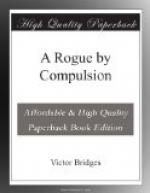“I’ll pick him up,” I said; “but what are we going to do about getting back? We had better not try Tilbury, or we may run into Latimer; it would put the hat on everything if he saw us together.”
Tommy consulted his watch. “It’s just half-past three now,” he said. “I vote we run across to Gravesend and catch the train there. Old Whiskers can bring the boat back here after we’ve gone—if he’s still sober.”
“Of course he’s sober,” said Joyce; “look at the beautiful way he’s walking.”
I should hardly have applied quite such a complimentary adjective to Mr. Gow’s gait myself, but all the same Joyce’s diagnosis proved to be quite correct. Mr. Gow was sober—most undoubtedly and creditably sober. I rowed to the bank, and brought him on board, and when we told him of our plans he expressed himself as being perfectly competent to manage the return journey single-handed.
“You leave ’er to me,” he remarked consolingly. “I shan’t want no help—not to bring ’er in here. Some people don’t hold with being alone in a boat, but that ain’t Luke Gow’s way.”
He went forward to get up the anchor, while Tommy and I occupied ourselves with the exciting sport of trying to start the engine. It went off at last with its usual vicious kick, and a few minutes later we were throbbing our way out of the creek into the main river.
The tide was right at its highest, and down the centre of the fairway straggled a long procession of big hooting steamers, sluggish brown-sailed barges, and small heavily-burdened tugs, puffing out their usual trails of black smoke. One felt rather like a terrier trying to cross Piccadilly, but by waiting for our chance we dodged through without disaster, and pulled up in a comparatively tranquil spot off the Gravesend landing-stage.
Tommy signalled to one of the boatmen who were hanging about the steps waiting for stray passengers.
“This chap will take us off,” he said, turning to Mr. Gow. “You push straight back while the engine’s running; she usually stops when we’ve got about as far as this.”
“And I’ll come over to the creek some time tomorrow,” I added; though in my present circumstances a confident prophecy of any kind seemed a trifle rash.
We went ashore and stood for a moment on the stage watching the Betty thread her course back through the traffic. Mr. Gow seemed to handle her with perfect confidence, and relieved on this point we turned round and set off for the station.
We found ourselves in luck’s way. An unusually obliging train was due to start in ten minutes’ time, and as before we managed to secure an empty compartment.
“I tell you what I want you to do when we get back to town, Joyce,” I said. “I want you to help me buy a hat.”
“What’s the matter with the one you’re wearing?” demanded Tommy. “It just suits your savage style of beauty.”
“Oh, this new one isn’t for me,” I explained. “It’s for a lady—a lady friend, as we say.”




